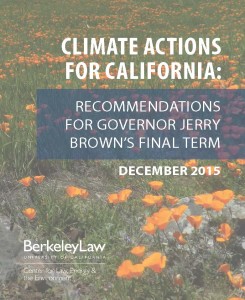In Paris this month, much of the talk related to California’s successful efforts to date in reducing carbon emissions while growing the economy. Certainly the state has made significant progress in areas like renewable energy and electric vehicles, and Governor Brown and his administration deserve a lot of credit.
 But more progress will be needed to meet the state’s much more aggressive mid-century goals of reducing emissions 80 percent over 1990 levels. The state will need both to build on existing programs and to address new areas that are key to decarbonizing the state’s economy, such as natural resources, water and land use.
But more progress will be needed to meet the state’s much more aggressive mid-century goals of reducing emissions 80 percent over 1990 levels. The state will need both to build on existing programs and to address new areas that are key to decarbonizing the state’s economy, such as natural resources, water and land use.
With just over three years remaining in Governor Brown’s final term, Berkeley Law’s Center for Law, Energy and the Environment (CLEE) is today releasing the new report “Climate Actions For California: Recommendations for Governor Jerry Brown’s Final Term.” The report details immediate steps that administration leaders, environmental and energy advocates, and other stakeholders can take to achieve additional short-term successes and create a foundation for long-term progress that endures beyond the administration.
“Climate Actions for California” contains recommendations based on interviews and a convening with Brown Administration officials, agency leaders, philanthropic representatives, and environmental experts.
Among the key recommended solutions:
- A state data platform to better share existing data and collect new data on pressing environmental challenges, particularly on water management and renewable energy planning;
- Improved inter-agency coordination on climate actions, particularly on demonstration projects to reduce emissions that can quickly scale statewide and for collaborating on efforts with new sources of funding;
- More collaborative regional conservation planning to facilitate advance mitigation for new projects and smart development going forward, among other benefits; and
- Enhanced transportation and land use planning that achieves greater co-benefits on water management and resource conservation.
The report provides more detail on these and other recommendations and also summarizes the key challenges that many of the experts we consulted identified, as well as possible next steps and partnerships. Ultimately, these actions could help Governor Brown build on an already-successful climate legacy and ensure that the progress to date continues, not just in California but now across the globe in a post-Paris world.
Leave a Reply
You must be logged in to post a comment.


